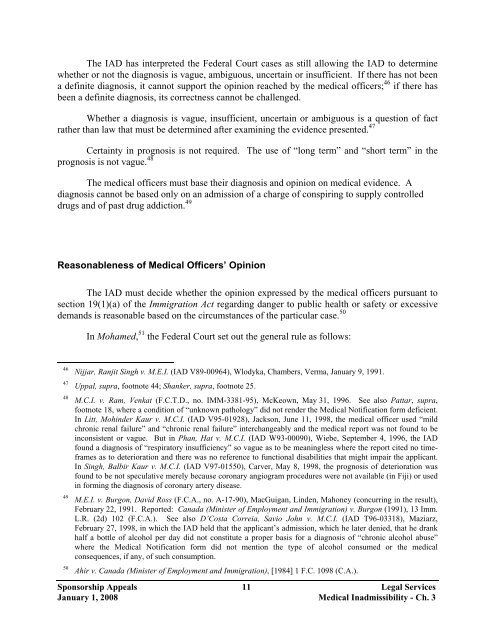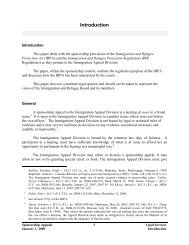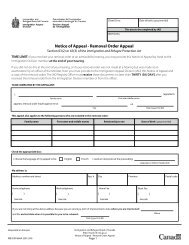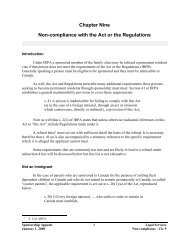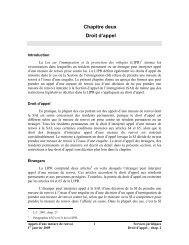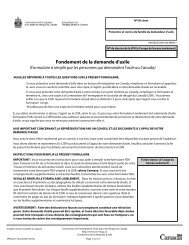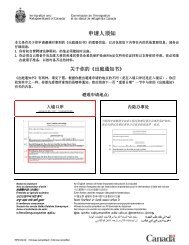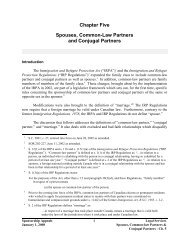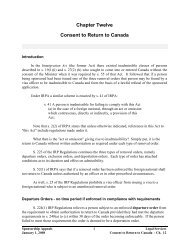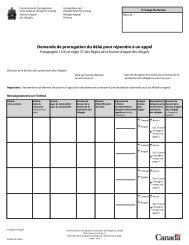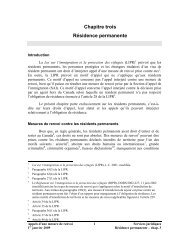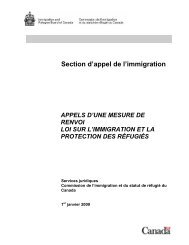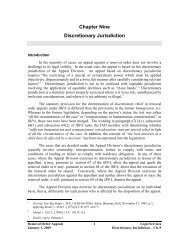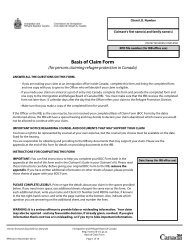Sponsorship Appeals - Immigration and Refugee Board of Canada
Sponsorship Appeals - Immigration and Refugee Board of Canada
Sponsorship Appeals - Immigration and Refugee Board of Canada
You also want an ePaper? Increase the reach of your titles
YUMPU automatically turns print PDFs into web optimized ePapers that Google loves.
The IAD has interpreted the Federal Court cases as still allowing the IAD to determine<br />
whether or not the diagnosis is vague, ambiguous, uncertain or insufficient. If there has not been<br />
a definite diagnosis, it cannot support the opinion reached by the medical <strong>of</strong>ficers; 46 if there has<br />
been a definite diagnosis, its correctness cannot be challenged.<br />
Whether a diagnosis is vague, insufficient, uncertain or ambiguous is a question <strong>of</strong> fact<br />
rather than law that must be determined after examining the evidence presented. 47<br />
Certainty in prognosis is not required. The use <strong>of</strong> “long term” <strong>and</strong> “short term” in the<br />
prognosis is not vague. 48<br />
The medical <strong>of</strong>ficers must base their diagnosis <strong>and</strong> opinion on medical evidence. A<br />
diagnosis cannot be based only on an admission <strong>of</strong> a charge <strong>of</strong> conspiring to supply controlled<br />
drugs <strong>and</strong> <strong>of</strong> past drug addiction. 49<br />
Reasonableness <strong>of</strong> Medical Officers’ Opinion<br />
The IAD must decide whether the opinion expressed by the medical <strong>of</strong>ficers pursuant to<br />
section 19(1)(a) <strong>of</strong> the <strong>Immigration</strong> Act regarding danger to public health or safety or excessive<br />
dem<strong>and</strong>s is reasonable based on the circumstances <strong>of</strong> the particular case. 50<br />
In Mohamed, 51 the Federal Court set out the general rule as follows:<br />
46<br />
47<br />
48<br />
49<br />
50<br />
Nijjar, Ranjit Singh v. M.E.I. (IAD V89-00964), Wlodyka, Chambers, Verma, January 9, 1991.<br />
Uppal, supra, footnote 44; Shanker, supra, footnote 25.<br />
M.C.I. v. Ram, Venkat (F.C.T.D., no. IMM-3381-95), McKeown, May 31, 1996. See also Pattar, supra,<br />
footnote 18, where a condition <strong>of</strong> “unknown pathology” did not render the Medical Notification form deficient.<br />
In Litt, Mohinder Kaur v. M.C.I. (IAD V95-01928), Jackson, June 11, 1998, the medical <strong>of</strong>ficer used “mild<br />
chronic renal failure” <strong>and</strong> “chronic renal failure” interchangeably <strong>and</strong> the medical report was not found to be<br />
inconsistent or vague. But in Phan, Hat v. M.C.I. (IAD W93-00090), Wiebe, September 4, 1996, the IAD<br />
found a diagnosis <strong>of</strong> “respiratory insufficiency” so vague as to be meaningless where the report cited no timeframes<br />
as to deterioration <strong>and</strong> there was no reference to functional disabilities that might impair the applicant.<br />
In Singh, Balbir Kaur v. M.C.I. (IAD V97-01550), Carver, May 8, 1998, the prognosis <strong>of</strong> deterioration was<br />
found to be not speculative merely because coronary angiogram procedures were not available (in Fiji) or used<br />
in forming the diagnosis <strong>of</strong> coronary artery disease.<br />
M.E.I. v. Burgon, David Ross (F.C.A., no. A-17-90), MacGuigan, Linden, Mahoney (concurring in the result),<br />
February 22, 1991. Reported: <strong>Canada</strong> (Minister <strong>of</strong> Employment <strong>and</strong> <strong>Immigration</strong>) v. Burgon (1991), 13 Imm.<br />
L.R. (2d) 102 (F.C.A.). See also D’Costa Correia, Savio John v. M.C.I. (IAD T96-03318), Maziarz,<br />
February 27, 1998, in which the IAD held that the applicant’s admission, which he later denied, that he drank<br />
half a bottle <strong>of</strong> alcohol per day did not constitute a proper basis for a diagnosis <strong>of</strong> “chronic alcohol abuse”<br />
where the Medical Notification form did not mention the type <strong>of</strong> alcohol consumed or the medical<br />
consequences, if any, <strong>of</strong> such consumption.<br />
Ahir v. <strong>Canada</strong> (Minister <strong>of</strong> Employment <strong>and</strong> <strong>Immigration</strong>), [1984] 1 F.C. 1098 (C.A.).<br />
<strong>Sponsorship</strong> <strong>Appeals</strong> 11 Legal Services<br />
January 1, 2008 Medical Inadmissibility - Ch. 3


